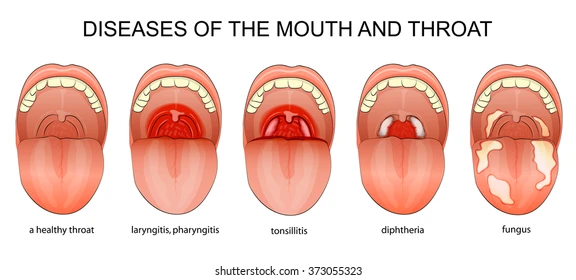What you need to know to protect yourself and family
- What is Diphtheria?
Diphtheria is a life-threatening infection caused by a bacteria that is easily transmitted from person to person through coughing, sneezing and contact with open sore/ blister/ wound on the skin.
- What are the types of Diphtheria?
The major types of diphtheria are:
- Respiratory diphtheria which is the common diphtheria that primarily affects the throat and tonsils. It appears as a thick grayish membrane in the throat, which can cause difficulty in breathing and swallowing.
- Cutaneous diphtheria which affects the skin resulting to the formation of sores/wounds. It is less severe than respiratory diphtheria.
- Nasal diphtheria which primarily affects the nasal passages resulting to runny nose, blocked nose, and bloody discharge from the nose.
- Oropharyngeal diphtheria which affects the oropharynx, the back of the throat and the tonsils resulting to formation of a membrane in the throat.
- What are the Causes of Diphtheria?
Diphtheria is caused by a bacteria called Corynebacterium diphtheriae. This bacteria produces a toxin that cause severe damage to the respiratory system, heart, skin and other organs.
- What are the signs and symptoms of diphtheria?
The Signs and symptoms commonly associated with diphtheria are:
- Sore throat which can be mild or severe, scratchy and painful.
- Painful sore/blister/wound.
- Thick gray or white membrane that covers the back of the throat and tonsils. This membrane can obstruct the airway and make breathing difficult.
- Swollen and tender Lymph nodes in the neck.
- Fever which can be moderate to high fever, usually above 38°C (100.4°F).
- Cough
- Difficulty swallowing
- Rapid breathing
- Difficulty breathing leading to blockage of the airway
- General weakness and fatigue
- Hoarseness or changes in voice when it affects the vocal cords.
- How can someone be infected?
The infection is spread from person to person through coughing or sneezing, touching of open sore/blister/wound on the skin and contact with infected household items.
- What is the incubation period?
The incubation period is usually 2 – 5 days after exposure but can extend to 10 days in some cases.
- Is there treatment for Diphtheria:
Yes, there is treatment for diphtheria.
If you experience any of the signs and symptoms of diphtheria, GO to the nearest health facility IMMEDIATELY for proper diagnosis and treatment.
- Who is at risk of contracting Diphtheria?
Everyone is at risk of getting infected with diphtheria, especially:
- Children under 5 years and adults above 60 years are more vulnerable.
- Children who have not completed 3 doses of Pentavalent vaccination
- People living in crowded area
- People that practice poor personal hygiene
- People living in areas with poor environmental hygiene and sanitary condition
- People with weakened immune systems
- People that travel to infected areas
- People living in areas with poor access to health facility
- People caring or having close contact to someone infected with diphtheria
- Healthcare workers in endemic areas
- How can Diphtheria be prevented?
- Get Vaccinated: Diphtheria can be primarily prevented through vaccination. In Nigeria, 3 doses of Pentavalent vaccine is administered to children to prevent against 5 diseases namely Diphtheria, Tetanus, Pertussis (whooping cough), Hepatitis B and Hemophilus influenzae type B. The 3 doses are given as follows:
- 1st Dose at 6 weeks of age
- 2nd dose at 10 weeks of age
- 3rd dose at 14 weeks of age
However, Tetanus Diphtheria (Td) vaccine is also given to the following categories of persons:
- children 2-5years old during campaigns
- pregnant women during Anti Natal Care (ANC)
- health workers that are involved in handling diphtheria outbreak vaccination response.
- Promote Herd Immunity when a significant portion of the population is vaccinated, the spread of the disease is limited because those who may not be able to receive the vaccine due to medical reasons are protected.
- Practice Good Personal hygiene as follows:
- Always wash hands with soap under clean running water
- Clean hands with alcohol-based hand sanitiser if there is no water
- Cover mouth and nose with tissue or bent elbow when coughing or sneezing. Throw used tissue into covered dustbin immediately
- Avoid close contact with sick persons
- Do not share personal items (clothes, cup, tooth brush) with another person
- Keep surroundings clean
- Avoid crowded places
- Go to the health facility if you have any of the symptoms of diphtheria
Remember, diphtheria can be treated if diagnosed early!
For further information:
- please contact healthpromotionnigeria@gmail.com
- follow us @Facebook and Youtube: Health Promotion Nigeria,
- Twitter: @HPDgov,
- Instagram: @HPDgov.ng




